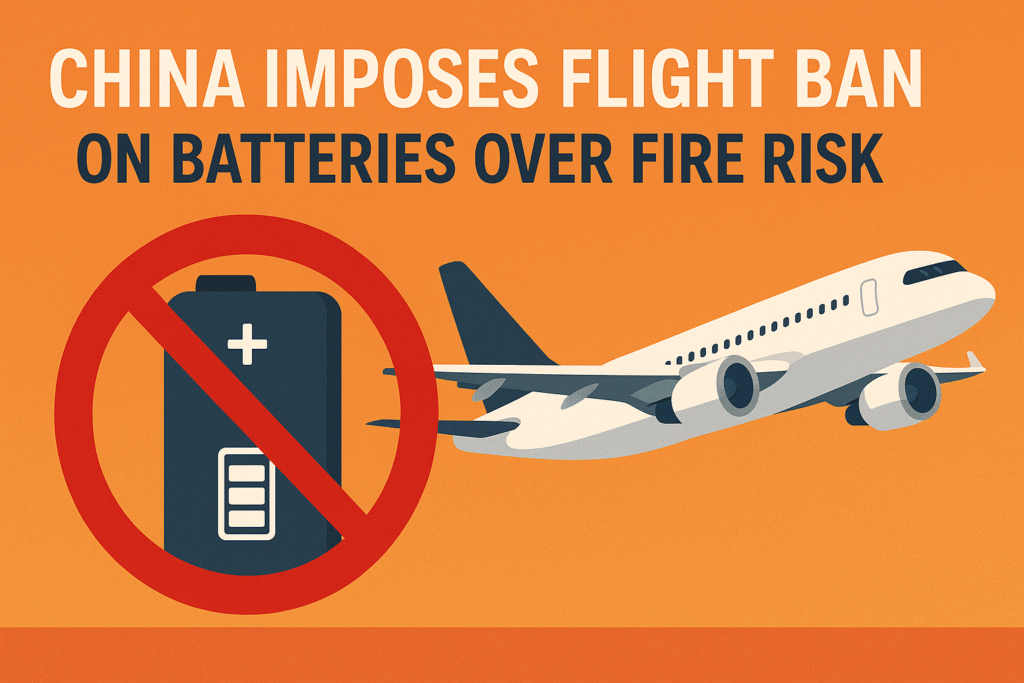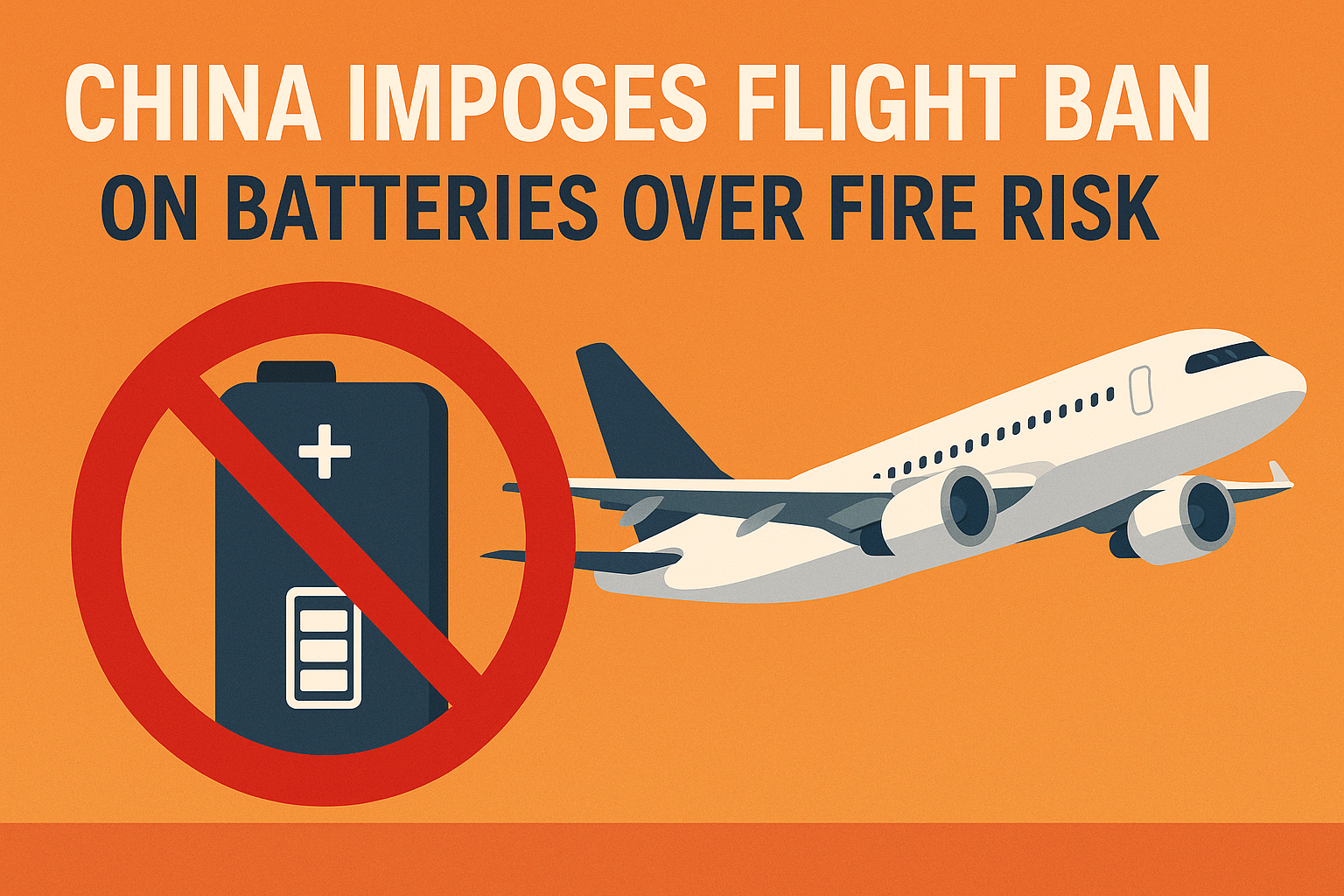China Imposes Flight Ban on Portable Batteries Amid Fire Safety Concerns
In a move that has sent shockwaves through the travel industry, China imposes flight ban on certain portable batteries, citing growing safety risks associated with lithium-ion cells. The sudden implementation has left many travelers confused and inconvenienced as they were forced to discard their portable power banks at airports across the country. The emergency regulation, enforced by China’s Civil Aviation Administration (CAAC), came into effect on Saturday with just two days’ notice.
The decision to restrict certain portable batteries follows a series of alarming incidents and recalls that have raised serious safety concerns. The CAAC stated in its notice that portable batteries not bearing a clear Chinese safety certification would no longer be allowed aboard flights. Additionally, any batteries that had been recalled by manufacturers were also banned. This announcement represents a significant escalation in travel safety protocols, one that diverges from the approach taken by most other countries.
Why China Imposes Flight Ban on Portable Batteries
The CAAC cited recent incidents involving portable batteries catching fire on planes as the primary reason why China imposes flight ban on these devices. The market regulator noted that several portable battery and battery cell manufacturers had their certifications suspended or revoked after investigations uncovered serious quality and safety deficiencies. These factors combined, the authority explained, demonstrated a growing risk to the safe operation of civil aviation in the country.
In recent months, two major Chinese battery companies have issued substantial recalls both domestically and internationally. Anker, one of the world’s largest producers of portable batteries, recalled over one million power banks in the US in June due to potential fire hazards. The company later recalled an additional 700,000 units in China, citing problems with lithium-ion battery cells supplied by unnamed vendors. Subsequently, Anker launched a global voluntary recall for five more models after identifying further risks linked to supplier-provided battery cells.
Similarly, Romoss, another Chinese battery manufacturer, pulled nearly 500,000 power banks from the market in June, also citing safety concerns related to battery cells sourced from third-party suppliers. These recalls highlight the widespread issues within the portable battery manufacturing sector and the underlying reasons why China imposes flight ban on certain portable batteries.
Impact on Travelers and Airlines
The sudden announcement has caused confusion and frustration among travelers across China. Many passengers reported being caught off guard at airports, only to learn they would need to discard their portable batteries before boarding. Given how essential portable power banks have become for modern travelers, especially for long-haul flights and multi-device users, the abrupt policy change has drawn criticism.
Previously, airlines globally had adopted guidelines governing the in-flight use and storage of portable batteries, restricting their capacity and requiring passengers to carry them in their cabin luggage rather than checked baggage. However, rather than issuing updated usage policies, China imposes flight ban by prohibiting the transportation of certain portable batteries entirely.
Aviation Industry’s Ongoing Battery Dilemma
The aviation sector worldwide has grappled with the risks posed by portable batteries for several years. Fires caused by lithium-ion batteries have resulted in numerous emergency landings and onboard incidents. Earlier this year, a fire destroyed an Air Busan plane on the tarmac in South Korea. While investigations are ongoing and no definitive link has been made between the fire and portable batteries, the incident renewed scrutiny of battery safety protocols in aviation.
In response, several Asian airlines revised their rules surrounding the transport and usage of portable batteries. Nonetheless, China imposes flight ban remains one of the most stringent measures implemented to date.
Future Implications and International Response
Experts predict that China’s decision will have ripple effects throughout the global travel industry. The country’s hardline stance may prompt other governments and aviation authorities to reevaluate their regulations. Given that portable batteries have become indispensable travel accessories, especially for business travelers and tech-savvy tourists, a unified international policy on portable battery transport could be on the horizon.
Manufacturers are also expected to ramp up safety testing and certification processes to meet the stricter standards now enforced in China. The CAAC’s emphasis on visible Chinese safety certification labels has underscored the importance of clear, reliable product labeling for consumers and regulators alike.
Why the Global Market Should Take Notice When China Imposes Flight Ban
Whenever China imposes flight ban or implements sweeping policy changes, it sends waves through international markets. China’s sizable consumer base, coupled with its role as a major hub for electronics manufacturing, means that decisions like this can influence global regulatory standards. Portable battery manufacturers may need to adopt China’s more stringent safety requirements if they wish to continue selling their products within the country.
Furthermore, international travelers heading to or transiting through China must now navigate a new set of rules. Airlines will need to issue updated travel advisories, and travel booking platforms may have to notify customers of the restrictions. Failure to comply with these new regulations could result in travelers having to forfeit their portable batteries at security checkpoints.
Conclusion
As China imposes flight ban on certain portable batteries amid escalating fire safety concerns, the implications extend far beyond its national borders. The move reflects growing anxieties within the aviation sector regarding lithium-ion battery safety and the urgent need for standardized, transparent regulations. Both travelers and manufacturers must adapt to the rapidly evolving safety landscape, as governments worldwide keep a close eye on China’s hardline approach.
With millions of portable batteries already recalled and safety certifications under scrutiny, this development underscores the critical role of proactive safety measures in protecting passengers and aircraft alike. As it stands, China imposes flight ban remains one of the most decisive actions taken in recent years to address this ongoing challenge in aviation safety.


3 thoughts on “China Imposes Flight Ban on 5 Types of Batteries Amid Fire Safety Concerns”
Comments are closed.